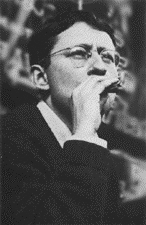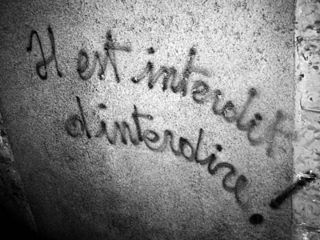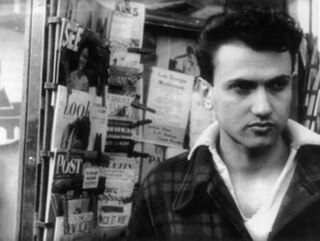
The Situationist International (SI) was an international organization of social revolutionaries made up of avant-garde artists, intellectuals, and political theorists. It was prominent in Europe from its formation in 1957 to its dissolution in 1972. The intellectual foundations of the Situationist International were derived primarily from libertarian Marxism and the avant-garde art movements of the early 20th century, particularly Dada and Surrealism. Overall, situationist theory represented an attempt to synthesize this diverse field of theoretical disciplines into a modern and comprehensive critique of mid-20th century advanced capitalism.

Guy-Ernest Debord was a French Marxist theorist, philosopher, filmmaker, critic of work, member of the Letterist International, founder of a Letterist faction, and founding member of the Situationist International. He was also briefly a member of Socialisme ou Barbarie.

The Letterist International (LI) was a Paris-based collective of radical artists and cultural theorists between 1952 and 1957. It was created by Guy Debord and Gil J. Wolman rejoined by Jean-Louis Brau and Serge Berna as a schism from Isidore Isou's Lettrist group. The group went on to join others in forming the Situationist International, taking some key techniques and ideas with it.

Psychogeography is the exploration of urban environments that emphasizes interpersonal connections to places and arbitrary routes. It was developed by members of the Letterist International and Situationist International, which were revolutionary groups influenced by Marxist and anarchist theory as well as the attitudes and methods of Dadaists and Surrealists. In 1955, Guy Debord defined psychogeography as "the study of the precise laws and specific effects of the geographical environment, consciously organized or not, on the emotions and behavior of individuals." One of the key tactics for exploring psychogeography is the loosely defined urban walking practice known as the dérive. As a practice and theory, psychogeography has influenced a broad set of cultural actors, including artists, activists and academics.
Raoul Vaneigem is a Belgian writer known for his 1967 book The Revolution of Everyday Life.

Robert Faurisson was a British-born French academic who became best known for Holocaust denial. Faurisson generated much controversy with a number of articles published in the Journal of Historical Review and elsewhere, and by letters to French newspapers, especially Le Monde, which contradicted the history of the Holocaust by denying the existence of gas chambers in Nazi death camps, the systematic killing of European Jews using gas during the Second World War, and the authenticity of The Diary of Anne Frank. After the passing of the Gayssot Act against Holocaust denial in 1990, Faurisson was prosecuted and fined, and in 1991 he was dismissed from his academic post.
Serge Thion was a French sociologist. A former researcher at the French National Center for Scientific Research, he was dismissed from his position at the center for Holocaust denial activities.

Isidore Isou, born Isidor Goldstein, was a Romanian-born French poet, dramaturge, novelist, film director, economist, and visual artist who lived in the 20th century. He was the founder of Lettrism, an art and literary movement which owed inspiration to Dada and Surrealism.

Pierre Guillaume is a French political activist and publisher. He was the founder of the Paris book shop La Vieille Taupe in 1965 and later the Holocaust denying publishing house of the same name. A former member of Socialisme ou Barbarie, he moved to Pouvoir Ouvrier with Jean-François Lyotard and Pierre Souyri.

La Société du Spectacle is a black-and-white 1974 film by the Situationist Guy Debord, based on his 1967 book of the same name. It was Debord's first feature-length film. It uses found footage and détournement in a radical Marxist critique of mass marketing and its role in the alienation of modern society.
Gérard Lebovici was a French film producer, editor and impresario.
Gil Joseph Wolman was a French artist. His work encompassed painting, poetry and film-making. He was a member of Isidore Isou's avant garde Letterist movement in the early 1950s, then becoming a central figure in the Letterist International, the group which would subsequently develop into the Situationist International.
Alain Guionnet is a French Holocaust denier.

Mémoires (Memories) is an artist's book made by the French social critic Guy Debord in collaboration with the Danish artist Asger Jorn. Its last page mentions that it was printed in 1959, however, it was printed in December 1958. This publication is the second of two collaborative books by Jorn and Debord whilst they were both members of the Situationist International.
La Guerre Sociale was an ultra-left journal appearing in France from 1977 to 1985. It attracted controversy over its support for negationism.

Serge July is a French journalist, founder of the daily Libération, and a prominent figure in French politics from the 1970s through the 1990s. In recent times, he has been active in French organizations working in support of journalists taken hostage in Syria.
Jaime Semprún was a French essayist and translator. He was born and died in Paris.

Socialisme ou Barbarie was a French-based radical libertarian socialist group of the post-World War II period whose name comes from a phrase which was misattributed to Friedrich Engels by Rosa Luxemburg in the Junius Pamphlet, but which probably was most likely first used by Karl Kautsky. It existed from 1948 until 1967. The animating personality was Cornelius Castoriadis, also known as Pierre Chaulieu or Paul Cardan. Socialisme ou Barbarie is also the name of the group's journal.
"Auschwitz or the great alibi" is a 1960 article published in Programme communiste, the French magazine of the International Communist Party (ICP), later reedited in the form of a brochure. The authorship of this text has been attributed to both Amadeo Bordiga and Martin Axelrad. However, the Programme communiste was a Bordigist revue, publishing its texts anonymously in order to emphasize its character of a collective work.
The Situationist International's interpretation of the Paris Commune of 1871 was influenced by their collaboration with Henri Lefebvre with whom they had been in contact since the late 1950s. Lefebvre’s writings on revolutionary romanticism and everyday life were important influences on the early SI. In the early 1960s Guy Debord, Attila Kotányi and Raoul Vaneigem agreed to assist Lefebvre in his preparations for a book on the Commune. The results of their brainstorming sessions were written down in 1962 by the SI in their “Theses on the Paris Commune.” After Lefebvre published his respective notes on their collaboration, in a 1962 piece entitled “La Signification de la Commune,” the two parties had a falling out as the SI ostensibly disagreed with the journal in which he published. Both the SI and Lefebvre published extensively on the feud in the following decade.










